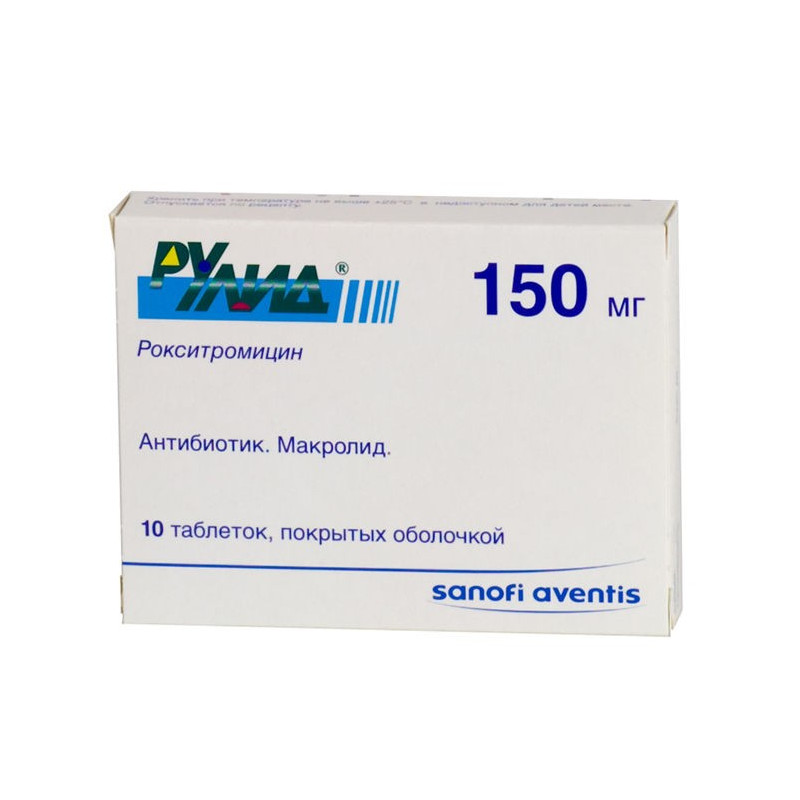



 All payments are encrypted via SSL
All payments are encrypted via SSL
 Full Refund if you haven't received your order
Full Refund if you haven't received your order
Coated tablets: 1 pill contains Roxithromycin 50, 100, 150 or 300 mg;
Excipients: hydroxypropylcellulose, polyoxyethylene, polyoxypropylene glycol, polyvidone, silicon dioxide colloid anhydride, Magnesium stearate, talc, starch;
shell: methyl hydroxypropyl cellulose, glucose anhydride, titania dioxide, propylene glycol.
10 pieces. in a strip, 1 strip in a carton box.
tab., pokr. about. 150 mg - P No. 017775/01-2000 03.16.05 GPR
tab., pokr. vol., 50 mg, 100 mg, 300 mg - P №0171775 / 03-2002 15.05.02
Semisynthetic antibiotic macrolide for oral administration.
To drug highly sensitive Bordetella pertussis, Borrelia burgdorferi, Moraxella (Branhamella) catarrhalis, Campylobacter coli, Campylobacter jejuni; Chlamydia trachomatis, Chlamydia psittaci, Chlamydia pneumoniae, Clostridium spp. (including Clostridium perfringens), Corynebacterium diphtheriae, Enterococcus spp., Gardnerella vaginalis, Staphylococcus spp. (methicillin-sensitive strains), Neisseria meningitidis, Helicobacter pylori, Legionella pneumophila, Lysteria monocytogenes, Mycoplasma pneumoniae, Pasteurella multocida, Peptostreptococcus spp., porphyromonas spp. (including Streptococcus pneumoniae).
To drug moderately sensitive Haemophilus influenzae, Ureaplasma urealyticum, Vibrio cholerae, Staphylococcus aureus, Staphylococcus epidermidis.
To drug are resistant Acinetobacter spp., Bacteroides fragilis, Enterobacter spp., Methicillin-resistant strains of Staphylococcus spp., Pseudomonas spp., Fusobacterium spp., Mycoplasma hominis, Nocardia spp.
Treatment of infectious and inflammatory diseases caused by microorganisms sensitive to the drug:
- infections of the upper respiratory tract (including acute pharyngitis, tonsillitis, sinusitis);
- infections of the lower respiratory tract (including pneumonia, bronchitis, bacterial infections in chronic obstructive pulmonary diseases, atypical pneumonia);
- infections of the skin and soft tissues;
- genital infections (including urethritis, cervicovaginitis);
- infections in dentistry.
- simultaneous administration of drugs such as ergotamine and dihydroergotamine;
- pregnancy;
- lactation (breastfeeding);
- hypersensitivity to macrolides.
For adults appoint 150 mg 2 times / day, with an interval of 12 hours. It is possible to assign 300 mg / day in 1 reception. The duration of taking Rulida depends on the indications for use, the severity of the infectious process and the activity of the pathogen.
For children The drug is prescribed depending on body weight, the type of pathogen and the severity of the infectious process.The average dose is 5-8 mg / kg / day, the duration of treatment is not more than 10 days.
For patients with hepatic impairment the drug is prescribed in a dose of 150 mg 1 time / day.
Roxithromycin should be taken before meals with plenty of water.
Allergic reactions: angioedema, bronchospasm, urticaria; rarely - anaphylactic shock.
Dermatologic: rash, hyperemia.
Gastrointestinal: a slight change in taste and smell, nausea, vomiting, abdominal pain, diarrhea (very rarely with blood), transient increases in transaminase and alkaline phosphorus, cholestatic or hepatocellular acute hepatitis; in some cases, symptoms of pancreatitis were observed.
Nervous system: dizziness, headache, weakness, paresthesias.
Effects due to biological effects: possible development of superinfection (due to the growth of insensitive microorganisms).
Rulide is contraindicated for use during pregnancy.
Small amounts of roxithromycin are excreted in breast milk, so during lactation it is necessary to stop either breastfeeding or taking the drug.
When prescribing Rulida to patients with impaired liver function, special care is necessary, monitoring liver function and correcting the dosing regimen.
When prescribing the drug to patients with renal insufficiency, as well as to elderly people, there is no need for correction of the dosage regimen.
Treatment: washed stomach; conduct symptomatic therapy. There is no specific antidote.
Combined use with ergotamine derivatives and ergotamine-like vasoconstrictor agents is not allowed, because may lead to the development of "ergotism" and necrosis of the tissues of the limbs.
When taken simultaneously with Digoxin, its absorption can be increased.
Macrolide antibiotics can increase serf concentrations of terfenadine while taking it, which can lead to the development of severe ventricular arrhythmias.Although this complication was not observed in roxithromycin, and no pharmacokinetic interactions or ECG changes were shown in volunteer studies, roxithromycin and terfenadine are not recommended.
With the simultaneous use of Rulida and indirect anticoagulants (warfarin), an increase in prothrombin time is possible.
With simultaneous use of Rulide (like other macrolides) can increase the half-life of midazolam, leading to an increase and an increase in the duration of the latter.
With simultaneous use of Rulida with theophylline and cyclosporine A, elevated plasma concentrations of the latter were noted (which did not require correction of the dosing regimen).
Combination with macrolides such drugs as astemizol, cisapride, pimozide, can lead to an increase in their serum concentration, as a result of competitive influence on the CYP3A isoenzyme, which leads to prolongation of the QT interval and / or severe arrhythmias.
Roxithromycin may replace protein-bound disopyramide, leading to an increase in the serum level of disopyramide. Recommended ECG monitoring and, if possible, determining the level of disopyramide in serum.
Clinically significant drug interactions with Carbamazepine, Ranitidine, antacids, oral contraceptives (estrogen-gestagena-containing) are absent.
The drug should be stored at room temperature.
Rulid